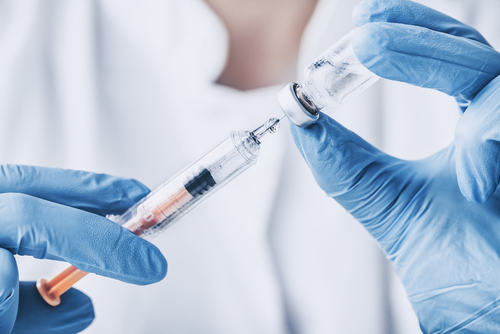Acthar Effective in Managing Persistent SLE Symptoms, Phase 4 Study Finds
Written by |

Treatment with H.P. Acthar Gel (repository corticotropin injection) can effectively help manage systemic lupus erythematosus (SLE) symptoms in patients with persistently active disease, according to recent Phase 4 clinical data.
The study, “Repository corticotropin injection in patients with persistently active SLE requiring corticosteroids: post hoc analysis of results from a two-part, 52-week pilot study,” was published in Lupus Science & Medicine.
Acthar is a prolonged-release, injectable formulation, a porcine adrenocorticotropic hormone (ACTH) analogue, designed to control the pro-inflammatory immune response in lupus and several other inflammatory diseases.
Marketed by Mallinckrodt Pharmaceuticals, the medicine is indicated as treatment of 19 medical conditions, including management of SLE exacerbations and as maintenance therapy for some SLE cases.
In an attempt to study the real-life effects of Acthar in SLE patients, researchers conducted a two-part Phase 4 trial (NCT01753401) in patients with active disease, and persistently active arthritis or rash despite prednisone administration.
The study, conducted in 20 clinical sites across the United States, included 38 patients who initially were randomized Acthar dosages – 0.5 mL daily or 1 mL every other day – or placebo for eight weeks.
Then, 33 patients who completed the treatment entered an open-label extension trial where all patients received Acthar for an additional 44 weeks – despite having received prior treatment or placebo. Participants were dosed with 0.2, 0.5 or 1 mL of Acthar, depending on each patient’s needs to achieve stable improvement.
During the trial, 33.3 percent of patients reported using immunosuppressant drugs, including azathioprine, methotrexate, or mycophenolate mofetil. Also, 72.2 percent used anti-malarial drugs.
At trial end, treatment with Acthar significantly reduced total hSLEDAI and BILAG disease activity scores from 10.0 and 15.7 in the beginning of the trial to 3.5 and 4.6, respectively.
All disease activity scores evaluated by the researchers, including a score for tender and swollen joints, improved continuously throughout the study period.
In addition, 36 percent of patients who received Acthar for the entire study had reduced their prednisone dose to less than 7.5 mg. Of the 12 patients on other immunosuppressive drugs, two stopped taking them and one reduced the dose.
No additional safety issues related to Acthar were reported during the trial. Most serious adverse events were associated with increased susceptibility to infection.
“Acthar demonstrated durable effectiveness in patients with persistently active SLE despite moderate dose corticosteroid therapy,” the researchers stated.
The results support the use of Acthar “as a treatment option for patients with SLE disease manifestations that are unresponsive to moderate-dose corticosteroid therapy,” they concluded
Acthar is being evaluated in a Phase 4 clinical trial (NCT02953821) for patients with persistently active SLE. The study is currently recruiting participants.




